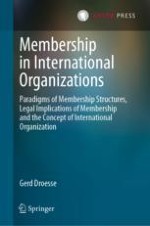2020 | OriginalPaper | Buchkapitel
10. New Concept of International Organization
verfasst von : Gerd Droesse
Erschienen in: Membership in International Organizations
Verlag: T.M.C. Asser Press
Aktivieren Sie unsere intelligente Suche, um passende Fachinhalte oder Patente zu finden.
Wählen Sie Textabschnitte aus um mit Künstlicher Intelligenz passenden Patente zu finden. powered by
Markieren Sie Textabschnitte, um KI-gestützt weitere passende Inhalte zu finden. powered by
